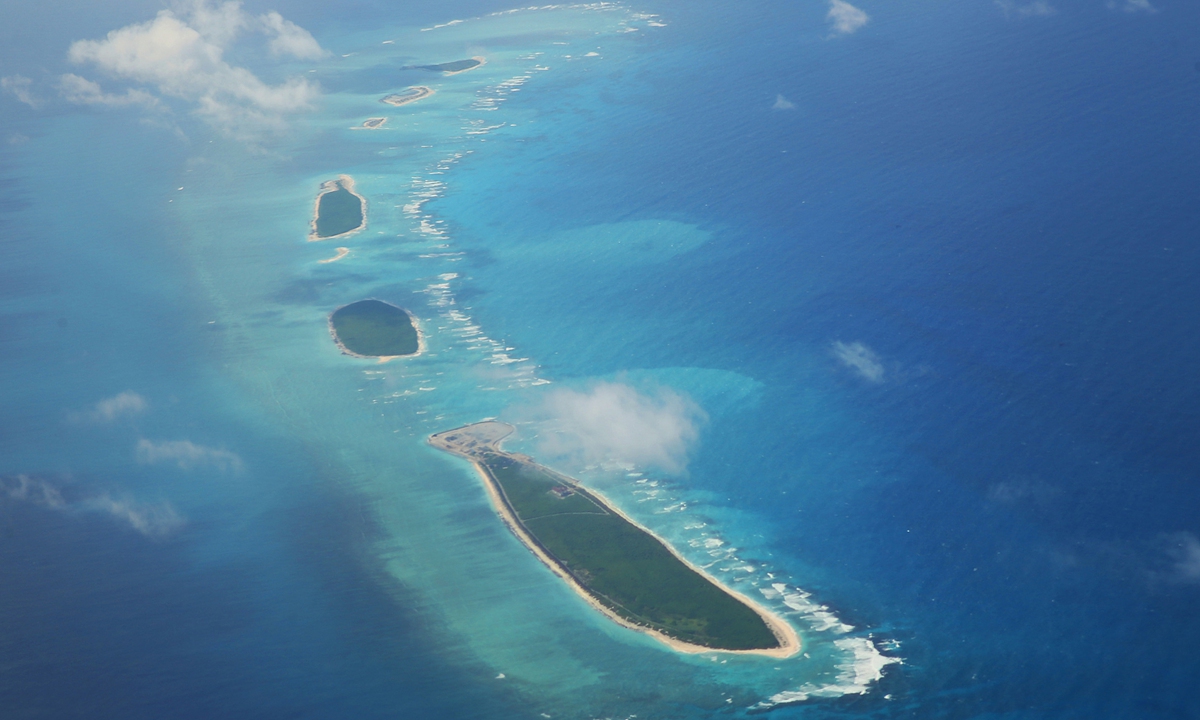
South China Sea Photo: VCG
By Zhao Yusha and Guo Yuandan
The Chinese military conducted joint sea-air combat readiness patrols in the South China Sea from Friday to Saturday to maintain peace and stability in the area, according to a statement by the Chinese People's Liberation Army (PLA) Southern Theater Command. The statement was issued after the Philippine Navy held live fire drills and carried out joint maritime exercises with the US in the South China Sea.
"Any military activity that stirs up trouble in the South China Sea is within our control," the PLA statement read.
The statement directly targets the provocative exercises conducted by the Philippine navy near Huangyan Dao, and its joint exercises with the US, Zhang Junshe, a Chinese military expert, told the Global Times, noting that the statement serves as a deterrent to countries that intend to infringe upon China's national sovereignty and signals that the PLA has the provocative actions being carried out in this region under control.
The Philippine Navy on Friday flexed its muscles by holding live fire drills during a "sovereignty patrol" near Huangyan Dao, which involved the frigate BRP Antonio Luna and patrol vessels BRP Ramon Alcaraz and BRP Andres Bonifacio, according to Naval News.
In a statement, the Philippine Navy said its unilateral exercise was "aimed at sustaining and improving the operational proficiency of both assets and personnel."
"Officers and crew of the three vessels trained on routine surface operations fostering their expertise and mastery in handling and manning the modern systems toward the efficient utilization of these combat ships in support of the Navy's overall mission." Lt. Commander Randy Garbo was quoted by Naval News as saying.
Zhang has viewed the Philippines' actions as intensified the level of provocation. First of all, China has repeatedly declared that the Philippines cannot infringe upon China's territorial sovereignty by making provocative moves near China's Huangyan Dao.
Moreover, the Philippines has clearly stated that it has dispatched naval forces, indicating that in the future, it may not only continue to send coast guard vessels, but may also deploy military forces, Zhang said.
The Philippine military said in a statement it held a "maritime cooperative activity" with the US on Friday and Saturday, its first for the year and fifth overall since launching the joint activities in 2023, per Reuters.
The activities "reinforced bilateral maritime cooperation and interoperability", the Philippine armed forces said.
The two military drills occurred only days after China and the Philippines held the 10th meeting of the bilateral consultation mechanism (BCM) on the South China Sea in Xiamen, East China's Fujian Province.
Chinese Vice Foreign Minister Chen Xiaodong and Philippine Foreign Undersecretary Maria Theresa Lazaro co-chaired the meeting on Thursday. The two sides agreed to strengthen maritime dialogue and communication, properly handle maritime disputes and differences and continue to advance maritime practical cooperation in various fields, including the coast guard, marine science and technology, and marine environmental protection.
In an interview ahead of Sunday's meeting with his ASEAN counterparts on the Malaysian island of Langkawi, Philippine Foreign Minister Enrique Manalo said Saturday that discussions on the Code of Conduct for the South China Sea were well underway, but ASEAN and China should make headway on the conduct for the South China Sea by tackling thorny "milestone issues," including its scope and if it can be legally binding.
After making provocative moves in the South China Sea, Manila has once again attempted to position itself on the moral high ground. However, it seems to obscure its own role in slowing down the discussions, Chen Xiangmiao, director of the World Navy Research Center at the National Institute for South China Sea Studies, told the Global Times.
Manila's slew of moves again demonstrate the inconsistency between the Philippines' words and actions, as instead of cooling down tensions in the South China Sea, it has instead escalated the conflict, Chen said.
Zhang noted that the Philippines will meet with a resolute response from China if it dares approach Huangyan Dao and carry out provocative actions. "We hope that the Philippines can stop its provocations and return to the right path of controlling disputes through consultation and negotiation."













